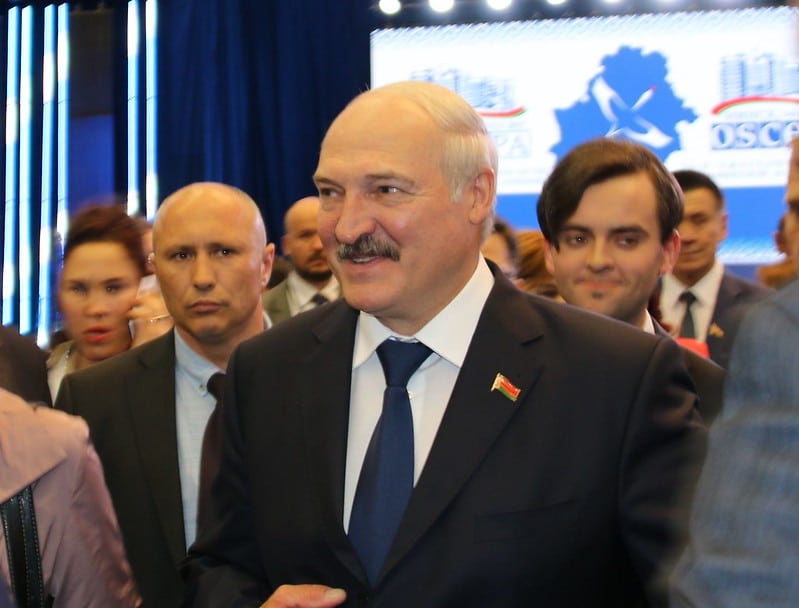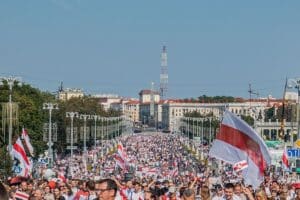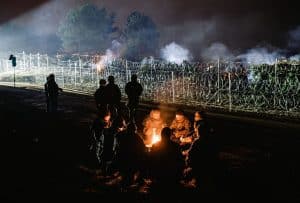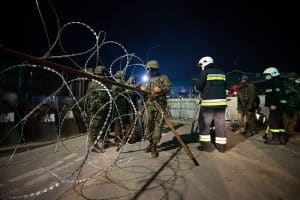Lukashenko in 2017 (Source Flickr)
Upcoming Sunday, February 27, Belarus will organize a constitutional referendum. While the result seems to be set in stone, the referendum reveals a broader power shift in the region – especially with the Ukraine-Russia tensions in mind. Moreover, it provides the Belarussian opposition a new opportunity to re-organize forms of civil dissent.
What will be amended?
The referendum asks; “Do you accept the amendments and additions to the Constitution of the Republic of Belarus?” When accepted, far-reaching powers will be given to the ‘All-Belarussian People’s Assembly’. However, this is far from a democratically chosen body by the Belarussian people – it consists solely of President Lukashenko’s loyal allies. The Assembly will gain the status as ‘highest representative body of democracy’. It receives the right to impose martial law and the state of emergency, and to elect and dismiss judges of the Supreme Court. Above all, it will be able to remove the president when the constitution is violated – keeping future power in the hands of Lukashenko if he decides to resign as president and to lead the Assembly.
Furthermore, Lukashenko receives life senatorship and personal immunity from persecution. Anyone who temporarily left the country during the last 20 years is prevented from becoming President, a change that appears to be aimed at opposition members who have been forced into exile. And finally, Lukashenko’s reign will be limited to two terms again, after an earlier amendment removed this rule. However, it counts from zero – Lukashenko can remain in power until 2035.
Response from the democratic opposition
The democratic opposition, many currently in exile, call upon Belarusians to spoil their ballots. Sviatlana Tsikhanouskaya, a major opposition figure since the 2020 protests, said that marking all options on the ballot would render them invalid. Possibly, the referendum will fail to receive the fifty percent support and voter turnout needed for approval. While seeming highly unlikely, spoiling the process is an important step for the Belarusian opposition in demonstrating their ongoing civil dissent. It currently does not plan major protests during the referendum – as it expects to face a major crackdown from state forces.
The geopolitical powerplay surrounding Belarus
‘Europe’s last dictator’ walks a tight rope between Russia’s increasing influence and domestic opposition. Lukashenko is not planning to resign in the foreseeable future, and the referendum does provide a new window for civil dissent. However, the upcoming referendum will still be held. It tells the tale of a shifting power balance towards Russia in Belarus after the 2020 protests. As Russia’s Putin helped Lukashenko keep power – he wishes something in return. Constitutional amendments are a long-wished desire from Moscow, as they want to re-balance Belarus, preventing a new round of country-wide protests.
Russia wants to depersonalize the Belarusian presidential system that currently revolves completely around Lukashenko. With or without Lukashenko, Belarus must remain in Russia’s sphere of influence. As already visible during the increasing tensions in Ukraine – Russia is militarily present in Belarus during large-scale exercises. Lukashenko adopts war-related rhetoric from Moscow, possibly putting Belarus in the position of armed conflict. Russian troops will ‘’monitor’’ the referendum – it all alludes to the increasing integration of Belarus into Russia. Furthermore, Belarus will lose constitutional status as a ‘neutral’ and ‘non-nuclear’ nation, seemingly beneficial to Moscow’s interests.
It remains doubtful whether amendments will be successful in detaching Belarusian leadership from Lukashenko, as he will receive full power over the Assembly. The January 2022 events in Kazakhstan also demonstrate that relinquishing power in name can still have consequences in the future – its former dictator Nazarbayev is now being ousted by his former allies. Thus, for the time being, Lukashenko is set to remain Belarus’ president.
Low attention in the West
After the 2020 mass protests and the 2021 migration crisis at the Polish border created by Lukashenko’s administration, Belarus is completely isolated from the West. Currently, attention on the referendum is low as the focus lies mainly on a possible invasion of Russia in Ukraine. Thirty-seven member states of the OSCE urged Belarus in late January to deploy an election monitoring mission (ODIHR) – however, Belarus declined. Since then, it has been silent regarding the upcoming referendum.
Nevertheless, this new power-grab by Lukashenko and Moscow in Belarus deserves attention and cannot remain under Europe’s radar. For what it is worth, the EU needs to continue strengthening the democratic opposition in and outside Belarus – strengthening their organization after a traumatic period of repression after the 2020 protests. The pressure on Lukashenko can be maintained through the continuing support of civil dissent.
Sources:
ABC News Atlantic Council AP News
Politico RFL/RL Open Democracy Carnegie
Photo: Flickr



